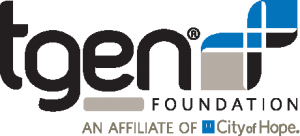TGEN OCNDS Research Program

The Translational Genomics Research Institute (TGen) is a nonprofit biomedical research organization located in Phoenix, Arizona. Since November 2016, TGen has been part of the City of Hope system, which has provided an enriched clinical environment to enhance the translational potential of its scientific discoveries.
TGen's team consists of interdisciplinary experts, including physicians and scientists, who are dedicated to unraveling the genetic factors behind both common and rare complex diseases affecting both pediatric and adult populations. TGen is driven by a mission to accelerate the translation of research findings into practical benefits for patients, ultimately improving the efficiency and effectiveness of medical interventions.
TGen's Center for Rare Childhood Disorders (C4RCD) applies the latest genomic technologies to diagnose and treat rare childhood neurological disorders. Through sequencing and other “omic” related approaches, C4RCD faculty identify the genetic causes of many rare or undiagnosed diseases and conditions that have long perplexed the medical community. C4RCD doesn't just diagnose; it also recommends traditional treatments and explores new ones by deeply analyzing genes and disease characteristics. Plus, it uses a combination of various models to test these treatments for optimal effectiveness. C4RCD also actively engages with communities, patients, and families to seek new insights and solutions collaboratively. The center aims to provide answers and extend those insights into effective treatments, thereby bringing hope and improved quality of life to affected children and their families.
In 2019, with CSNK2A1 Foundation support, TGen established the OCNDS Research Program focused on studying the CSNK2A1 mutation. Through the support, C4RCD team at TGen has established patient-derived fibroblast cell models and zebrafish models for Okur-Chung Neurodevelopmental Syndrome (OCNDS) caused by CSNK2A1 mutation. These model systems can be strong tools for understanding how diseases work and testing potential treatments.
Current TGen Research Initiatives
Currently, we are funding characterization of OCNDS iPSC models. Learn more about this project here.
Past TGen Research Initiatives
At TGen, there are 3 OCNDS zebrafish models representing the following mutations: K198R, R47G, and D156E. Currently, scientists at TGen’s C4RCD are focusing on studying how various mutations (R47G, Y50C, D156E, K198R, and R191X) in the CSNK2A1 gene affect the way it functions and how these mutations lead to different characteristics or traits. These traits can provide us with more useful information for creating better models in preclinical research. To do this, they are using a zebrafish model system with the CSNK2A1 gene. This system will help them quickly test many FDA-approved drugs to see if they have any positive effects. The goal is to speed up the process of finding and confirming potential treatments for OCNDS patients. You can learn more about OCNDS research at TGen.
